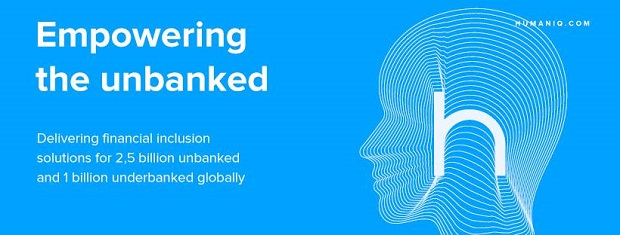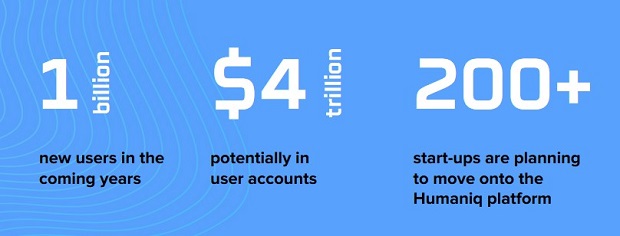* – This article has been archived and is no longer updated by our editorial team –
Banking is one of those things everyone takes for granted. ATMs are at every corner. Even the smallest store accepts credit card payments. And thanks to mobile technology, all of our banking tools are with us everywhere we go.
It’s hard to imagine a time before all of these essentials existed — a time when all dealings involved the exchange of cash or goods. And yet, almost 2.5 billion people in the world have no access to banking infrastructures. All of their transactions happen through the manual exchange of physical money. This means that they are completely cut off from any possibility for business investment or personal finance.
Moreover, according to The World Bank website, “An estimated 1.1 billion people in the world are unable to prove their identity. That is 1 in every 7 individuals” . Without proper identification, even if these people had access to a banking infrastructure, they would not be able to make use of it.
The problems mentioned above are predominant in Africa, particularly in the sub-Saharan region. The lack of infrastructure and documentation has served to exacerbate the economic situation of these countries.
 Recommended: Wideo Helps You Create Engaging Videos From Scratch Or Based On More Than 90 Video Templates
Recommended: Wideo Helps You Create Engaging Videos From Scratch Or Based On More Than 90 Video Templates
However, the past few years have brought important changes to the African economic climate.
Africa has the youngest demographic in the world. Moreover, between 2018 and 2021, its economy is projected to grow at a faster rate than the global average . These factors make it a very attractive destination for foreign investment.
New tech trends and investments bring promising opportunities
2017 was characterised by big movements in the sub-Saharan startup scene. Techcrunch reports that, “Africa is fast becoming home to a dynamic tech sector” .
Additionally, the past few years have seen exponential growth in the use of mobile phones and mobile data. New smartphones are increasingly more affordable, and there is a growing market for second-hand devices. This has brought about an uptake in mobile broadband data, which is driving demand for digital content, resulting in increased mobile traffic. GSMA reports that, “Traffic is forecast to grow twelvefold across Africa as a whole over the next five years” .
These trends promise to be the key to a new approach to banking for these underserved regions. In fact, the increased adoption of mobile phones and consumption of digital content are already contributing to social and economic development in sub-Saharan regions.
An expanding mobile money ecosystem
Mobile operators are now collaborating closely with a number of startups, allowing them to leverage their existing assets such as APIs and distribution networks. In return, mobile operators benefit from the innovation that these startups bring about.
Some of the successful collaborations include:
● Eneza Education, which serves nearly 2 million students with online educational lessons and assessments.
● mTick, which allows customers to buy and reserve inter-regional bus tickets via mobile money.
● Nova Lumos, which provides home solar systems that customers can pay for via MTN’s carrier billing service.
● Zazu Africa, which is a digital marketplace that bridges the gap between farmers and buyers.
As more startups engage in agreements with mobile operators, the resulting collaborations have the potential to advance the digital economy across the region.
However, despite the rapidly-growing penetration of mobile services, Africa is still far from where it needs to be. Africa’s internet penetration is currently at 35.2%, which is way below the 58.4% mark in the rest of the world .
If Africa wants to maximise its technical future, it will need widespread connectivity, and a number of businesses, including such giants as Google and Facebook are already in a race to get the continent online .
Mobile – The key to empowering the unbanked
As mobile infrastructure and adoption grow in Africa, so does the opportunity to cater for billions of unbanked people on the continent. The current trends clearly show that people are willing to adopt the mobile payments transactional model. But what about those people who do not have a bank account, and therefore cannot take advantage of mobile payments?
 Recommended: Awz HLS Fund – Next Generation Cyber Security, Intelligence And Physical Security Technologies
Recommended: Awz HLS Fund – Next Generation Cyber Security, Intelligence And Physical Security Technologies
That is where Humaniq intends to make its contribution to the African market. Humaniq is a new generation financial service with its own cryptocurrency, aimed at eradicating poverty in emerging economies.
Humaniq’s financial services are based on Blockchain technology, mobile devices and biometric identification systems. More importantly, they are available to anyone owning an entry level smartphone equipped with a front-facing camera, and a basic mobile internet connection.
Users will be able to transfer money at no cost by using their smartphone’s internet connection. The phone’s camera is used to provide “proof of face”, which grants secure access to the system for people without identification documents, and allows them to earn their first coins via the referral system.
Unlike other cryptocurrencies, Humaniq provides an egalitarian emission mechanism. The amount of coins that one person can mint is limited, and does not involve competing in specialized hardware, consuming electricity, or owning other coins ahead of time. All that is needed is “proof of face” mechanism mentioned above.
Once users have earned their first coins, they can then use them to engage in commercial and personal transactions, and start on the path to financial stability.
By supplying banking tools that can provide liquidity for entrepreneurial ventures via loans, investment, online work and crypto financing, Humaniq’s mission is to help people break out of poverty, and create new opportunities in the digital economy. Additionally, Humaniq serves as a platform for other businesses to step in and empower people in emerging economies.
As Africa’s economy and tech scene continue to grow, the continent’s people call for more opportunities to flourish and reach their full potential. A number of intrepid startups have already stepped in to make their contribution, and many more are sure to follow.
To learn more about Humaniq’s goals for helping the unbanked in Africa (and other regions worldwide), and their business model, please read the Humaniq Whitepaper and visit the official Humaniq website.

